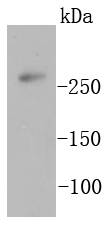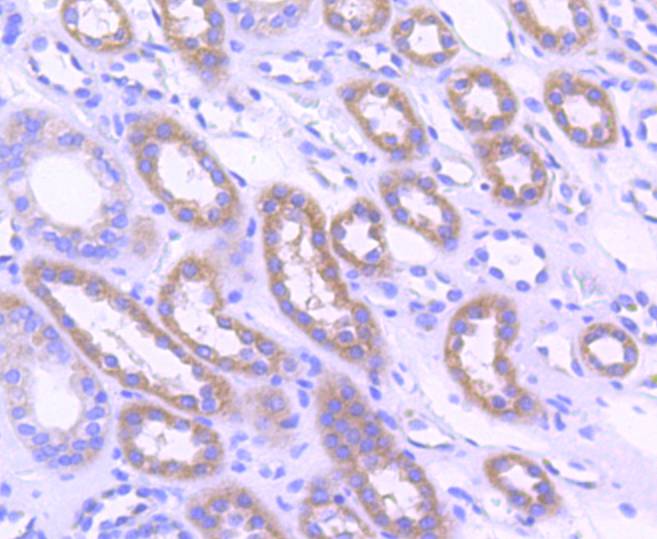Product Name :
Anti-Acetyl CoA Carboxylase 1(ACC1) polyclonal antibody Background :
Acetyl-CoA carboxylase (ACC) is a complex multifunctional enzyme system which catalyzes the carboxylation of acetyl-CoA to malonyl-CoA, the rate-limiting step in fatty acid synthesis. Exercise diminishes the activity of acetyl-CoA carboxylase in human muscle. ACCα (ACC1) is the rate-limiting enzyme in the biogenesis of long-chain fatty acids, and ACCβ (ACC2) may control mitochondrial fatty acid oxidation. These two isoforms of ACC control the amount of fatty acids in the cells. The catalytic function of ACCα is regulated by phosphorylation (inactive) and dephosphorylation (active) of targeted serine residues and by allosteric transformation by citrate or palmitoyl-CoA, which serve as the enzyme’s short-term regulatory mechanism. The gene encoding ACCα maps to human chromosome 17 and encodes a form of ACC, which is the major ACC in lipogenic tissues. The catalytic core of ACCβ is homologous to that of the ACCα, except for an additional peptide of about 150 amino acids at the N-terminus. Product :
Rabbit IgG, 1mg/ml in PBS with 0.02% sodium azide, 50% glycerol, pH7.2 Storage&Stability :
Store at +4°C after thawing. Aliquot store at -20°C or -80°C. Avoid repeated freeze / thaw cycles. Specificity :
ACC1 polyclonal antibody detects endogenous levels of ACC1 protein. Immunogen :
recombinant protein Conjugate :
Unconjugated Modification :
Acetylated
Anti-Acetyl CoA Carboxylase 1(ACC1) polyclonal antibody Background :
Acetyl-CoA carboxylase (ACC) is a complex multifunctional enzyme system which catalyzes the carboxylation of acetyl-CoA to malonyl-CoA, the rate-limiting step in fatty acid synthesis. Exercise diminishes the activity of acetyl-CoA carboxylase in human muscle. ACCα (ACC1) is the rate-limiting enzyme in the biogenesis of long-chain fatty acids, and ACCβ (ACC2) may control mitochondrial fatty acid oxidation. These two isoforms of ACC control the amount of fatty acids in the cells. The catalytic function of ACCα is regulated by phosphorylation (inactive) and dephosphorylation (active) of targeted serine residues and by allosteric transformation by citrate or palmitoyl-CoA, which serve as the enzyme’s short-term regulatory mechanism. The gene encoding ACCα maps to human chromosome 17 and encodes a form of ACC, which is the major ACC in lipogenic tissues. The catalytic core of ACCβ is homologous to that of the ACCα, except for an additional peptide of about 150 amino acids at the N-terminus. Product :
Rabbit IgG, 1mg/ml in PBS with 0.02% sodium azide, 50% glycerol, pH7.2 Storage&Stability :
Store at +4°C after thawing. Aliquot store at -20°C or -80°C. Avoid repeated freeze / thaw cycles. Specificity :
ACC1 polyclonal antibody detects endogenous levels of ACC1 protein. Immunogen :
recombinant protein Conjugate :
Unconjugated Modification :
Acetylated
-
 Western blot analysis of Acetyl CoA Carboxylase 1 on mouse kidney lysates using anti-Acetyl CoA Carboxylase 1 antibody at 1/1,000 dilution.
Western blot analysis of Acetyl CoA Carboxylase 1 on mouse kidney lysates using anti-Acetyl CoA Carboxylase 1 antibody at 1/1,000 dilution. -
 Immunohistochemical analysis of paraffin-embedded human kidney tissue using anti-Acetyl CoA Carboxylase 1 antibody. Counter stained with hematoxylin.
Immunohistochemical analysis of paraffin-embedded human kidney tissue using anti-Acetyl CoA Carboxylase 1 antibody. Counter stained with hematoxylin.
Bioworld Biotech only provide peptides for our antibodies and do not provide additional peptide customization services.
Price/Size :
USD 368/1mg/vial
Tips:
For phospho antibody, we provide phospho peptide(0.5mg) and non-phospho peptide(0.5mg).Describe :
Blocking peptides are peptides that bind specifically to the target antibody and block antibody binding. These peptide usually contains the epitope recognized by the antibody. Antibodies bound to the blocking peptide no longer bind to the epitope on the target protein. This mechanism is useful when non-specific binding is an issue, for example, in Western blotting (WB) and Immunohistochemistry (IHC). By comparing the staining from the blocked antibody versus the antibody alone, one can see which staining is specific; Specific binding will be absent from the western blot or IHC performed with the neutralized antibody.Formula:
Synthetic peptide was lyophilized with 100% acetonitrile and is supplied as a powder. Reconstitute with 0.1 ml DI water for a final concentration of 10 mg/ml.The purity is >90%,tested by HPLC and MS.
Storage:
The freeze-dried powder is more stable. For short time at 2-8°C. For long term storage store at -20°C.
Note :
This product is for research use only (RUO only). Not for use in diagnostic or therapeutic procedures.
 Anti-Acetyl CoA Carboxylase 1(ACC1) polyclonal antibody
Anti-Acetyl CoA Carboxylase 1(ACC1) polyclonal antibody  Datasheet
Datasheet COA
COA MSDS
MSDS SHIP
SHIP